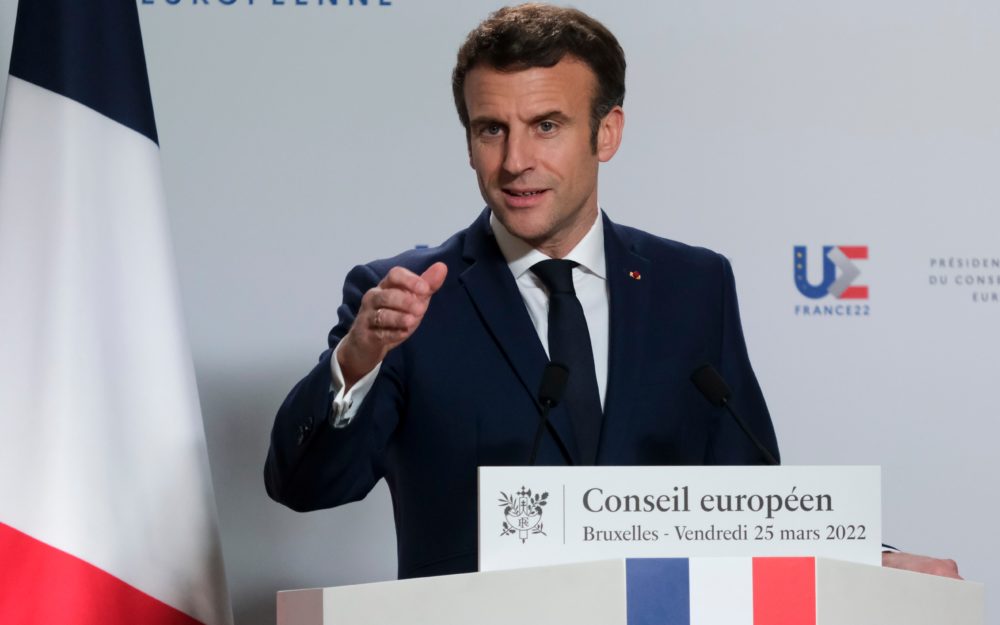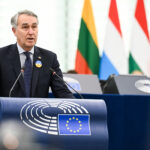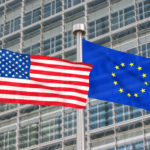Calls for EU membership for Ukraine and other countries are increasing – but the French president seems to have another idea…
On Europe Day (9 May 2022), French President Emmanuel Macron delivered a speech at the closing ceremony of the Conference for the Future of Europe in Strasbourg in which he called for the creation of a “European political community”. He notably said:
[…] This new European organization would allow democratic European nations that subscribe to our shared core values to find a new space for political and security cooperation, cooperation in the energy sector, in transport, investments, infrastructures, the free movement of persons and in particular of our youth. Joining it would not prejudge future accession to the European Union necessarily, and it would not be closed to those who have left the EU.
The French leader’s proposal came after Russia’s aggression against Ukraine triggered a raft of new membership applications. On 28 February, Ukraine’s President Volodymyr Zelensky was the first to lodge an official application for EU membership for his country. “We ask the European Union for Ukraine’s immediate accession via a new special procedure.” Moldova and Georgia followed suit.
A substitute for EU enlargement?
Macron’s suggestion of a two-tier or multi-tier EU was very likely an attempt to find a middle way. A few days after his Strasbourg speech, Zelensky criticized Macron’s idea, arguing that:
[…] Our accession can only strengthen the EU, we cannot be kept at a distance […] We cannot remain in this uncertain situation forever. It’s like a table where the whole family is gathered, you are invited, but you haven’t been given a seat. It’s not fair […] Ukraine respects the European Union, and we want the same respect.
Several Central and Eastern European states – notably Poland, Estonia, Latvia, Lithuania, the Czech Republic and Slovakia – came out in support of Ukraine’s membership bid. Others, including France, were much more reluctant. As evidenced in the latest EURACTIV map below, a majority of EU countries are either currently hesitant about Ukraine’s candidate status or awaiting the opinion of the European Commission (expected this week) before revealing their position.
On 19 May, while addressing a session of the European Economic and Social Committee, European Council President Charles Michel called for the creation of a “European geopolitical community”. Michel was swift to point out that “This initiative is in no way intended to replace enlargement – or to find a new excuse for procrastination. Nor is it a guarantee for those who participate that they will one day be a member of the European Union.”
Michel most certainly wanted to dissipate Ukrainian worries that the new proposal was in effect a substitute for EU accession. Bloomberg reports that “Ukraine [is] likely to win initial EU backing for path to membership”, with the Commission set to deliver their opinion and recommendation for Ukraine’s membership application in the coming days.
Former ‘Greens’ MEP Helga Trüpel is not convinced by Macron’s proposal. In a comment for EU Watch, she says “No, I don‘t share that approach by Macron. It puts countries like Ukraine in a position not being on eye level with the Member States. I share the demand by the Government of Ukraine to become a candidate country with a normal accession process.”
French vision of Europe?
The idea of a multi-tier Europe has been present for decades. It was originally a French idea. Thirty years ago, then-French President François Mitterand proposed a Europe of “concentric circles in which the central and eastern European countries would be put in a political halfway house to prepare themselves for eventual EC [European Community] membership.”
Mitterrand suggested different levels of integration, both political and economic, with a strong core that would act as a powerhouse for deeper integration and more efficient decision-making, especially in terms of facing a multitude of crises simultaneously on various fronts.
Macron’s proposal mirrors that of his predecessor. In 2018, the French president already pointed out that:
[…] We also have to accept, support the fact that this Europe will be a Europe of several circles, because it already is and so we have to accept there is a broad Europe, perhaps broader than the European Union, the Council of Europe forming, moreover, this broader base, founded on our principles, which are at times undermined even within the EU.
“We do not support unconsidered and premature attempts to launch a process towards treaty change.”

French President Emmanuel Macron gestures as he speaks to the media after European Union leaders’ summit, amid Russia’s invasion of Ukraine, in Brussels, Belgium, March 25, 2022. Alexandros Michailidis / Shutterstock.com
Treaty change?
The timing of the “Wider Europe” discussion is no coincidence. The Conference on the Future of Europe concluded in May with various recommendations, some of which require treaty changes. In a proposal to reform the EU’s decision-making process, the final report on the Conference proposes:
[…] Reassessing decision-making and voting rules in the EU institutions, focusing on the issue of unanimous voting, which makes it very difficult to reach agreement, while ensuring a fair calculation of voting ‘weights’ so that small countries’ interests are protected; … All issues decided by way of unanimity should be decided by way of a qualified majority. The only exceptions should be the admission of new membership to the EU and changes to the fundamental principles of the EU as stated in Art 2 TEU and the Charter of Fundamental Rights of the European Union.
This sparked some of the EU’s states to react with a non-paper arguing that “ … We do not support unconsidered and premature attempts to launch a process towards treaty change.” On the contrary, France expressed support for launching a treaty change process, while German Chancellor Olaf Scholz did not rule it out, stressing that “If the matter requires it, then we can talk about changing the treaties, including a convention. That’s not a taboo.”
The proposal for an outer ring of non-member states comes at a time when accession talks of North Macedonia and Albania with the EU are stalling. Experts were quick to question whether the Macron/Michel proposal was in essence designed to substitute EU membership with something lighter, mainly because of certain member states’ reluctance to allow Ukraine, Moldova, and Georgia to enter the EU. At the same time, it remains unclear whether or not countries from the Western Balkans are seen as part of the political community proposal. All of this shows that the extensive system of the European Union is in for an overhaul.
In an interview with EU Watch, former Polish Foreign Minister and current MEP Witold Waszczykowski argued that Macron’s proposal was “a kind of trap for these countries. It would keep them in limbo”. He added: “They really count on EU membership, not on some sort of a new substitute institution.”
“Leaders from the Western Balkans such as Serbia and Albania have already publicly endorsed Macron’s proposal”
Western Balkans
Details of the initiative are still unknown. Macron briefly mentioned the Western Balkans in his Europe Day speech, stressing that “Already, several Western Balkan countries have begun the accession process. And this will continue, and they have a path ahead which has already been paved.” Does he refer to Serbia and Montenegro for which the accession talks are ongoing, or does he also include North Macedonia and Albania for which the European Council decided to open negotiation talks in 2020? And what about Bosnia-Hercegovina and Kosovo?
As the June summit of EU leaders is approaching, the provisional agenda of the meeting briefly mentions the term ‘Wider Europe’. It is presumably another designation for the EPC. However, leaders from the Western Balkans such as Serbia and Albania have already publicly endorsed Macron’s and Michel’s proposal for a political or geopolitical community designed to bring countries closer to the EU that are not yet integrated into the Union.
During a meeting with Michel, Serbian President Aleksandar Vučić said that he did not “see anything bad in this for Serbia and, as far as Serbia is concerned, I believe that after the discussion I will be having with the government representatives, we will be joining with great pleasure and great hope.” The Prime Minister of Albania, Edi Rama, also spoke of the need to renew, expand and deepen the cooperation between the countries of the Western Balkans and the European Union. On the matter of the European political community, Rama said:
“I have discussed this for a long time not only with the President of the European Council, but also with the French President, the previous and the new [German] Chancellor – the idea being the need for the EU to overcome this stage in which our whole relationship – as Albania but also as WB countries – goes only through the European integration process, chapters or clusters, etc., and take further steps to bring the WB much closer from a political standpoint […] by putting in place an immediate political integration.”
Accession fatigue in North Macedonia?
In 2020, the European Council endorsed the decision to open accession negotiations with North Macedonia and Albania, and in July 2020 the European Commission presented the draft negotiating frameworks for the two countries. The June summit is seen as critical for North Macedonia and Albania, especially to the former. As a candidate country that received numerous recommendations from the EU Commission to open accession talks with the EU, disappointment seems to be present more than ever before in the small Balkan republic.
The “Balkan Barometer 2021” opinion survey in the Western Balkans puts the support for EU membership in North Macedonia at 53 percent – the lowest it has ever been. Moreover, after the long dispute with Greece, North Macedonia now faces another obstacle – its neighbour Bulgaria.
Bulgarian veto?
Sofia is disputing the country’s “language and history.” Bulgaria’s demands have ranged from North Macedonia to recognize that their people and the Macedonian language have Bulgarian roots to demanding the recognition of Bulgaria’s minority in North Macedonia (recognition after opening the negotiations, then backtracking and stressing that it should be done as a precondition of lifting the veto to start accession negotiations).
An example of this is the border management agreement between the EU and North Macedonia (Frontex) which has been in limbo for over two years because of Bulgaria’s reluctance to accept the language as “Macedonian”. EURACTIV mentions that the issue of the ‘Macedonian language’ hasn’t prevented Sofia from signing various agreements with Skopje, in which it is specified that the agreement has been signed in the official languages of Bulgaria and Macedonia”.
“In accordance with set criteria, let us offer the integration of all of the Western Balkans into the EU by 2033 — an ambitious but achievable timeline”
What next?
The European Parliament adopted the countries’ report for North Macedonia and Albania on 19 May 2022. MEPs urged the EU to open accession talks with the countries arguing that “The Parliament asks the Council to officially start accession negotiations with these two countries, noting the geostrategic context of relations with Russia and its aggression against Ukraine.”
MEPs want the EU to critically assess historically important security implications of any such a decision for the stability and unity on the European continent and the Western Balkans.
At the Europea Forum 2022, German Foreign Minister Annalena Baerbock called for the EU “to swiftly open accession negotiations with North Macedonia & Albania. That’s what we promised, we can’t keep the Western Balkans waiting any longer.”
From the south of Europe, the Prime Minister of Greece Kyrios Mitsotakis in a recent Op-Ed called for a more tangible promise to the Western Balkans “let us offer the integration of all of the Western Balkans into the EU by 2033 — an ambitious but achievable timeline.” with the first step to be taken at the EUCO June summit “to unblock the path of North Macedonia and Albania.”
Former MEP Helga Trüpel shared her belief in the future of the Western Balkans. She says that “I hope that the Western Balkans will enter the EU on equal footing”. Since there are some clear risks if that doesn’t happen she emphasizes that the EU should “not give Putin the chance to put them in his power interest. The EU should realize that in order to fight back against Putin we have to stick together, to enlarge and deepen EU democracy at the same time.”
It is becoming apparent that Russia’s invasion of Ukraine has reinvigorated the debate on the EU’s position as a strategic actor in the region and beyond. EUCO June summit for North Macedonia’s patience could be crucial – the country fulfilled the necessary criteria to open accession talks, however, faces identity obstructions by a neighboring country. An EU-Western Balkans leaders’ meeting is scheduled on 23 June during the EU leaders summit. The question remains – are we going towards a Wider Europe and how would it look?
Authors: Michael Thaidigsmann, Nenad Jurdana






